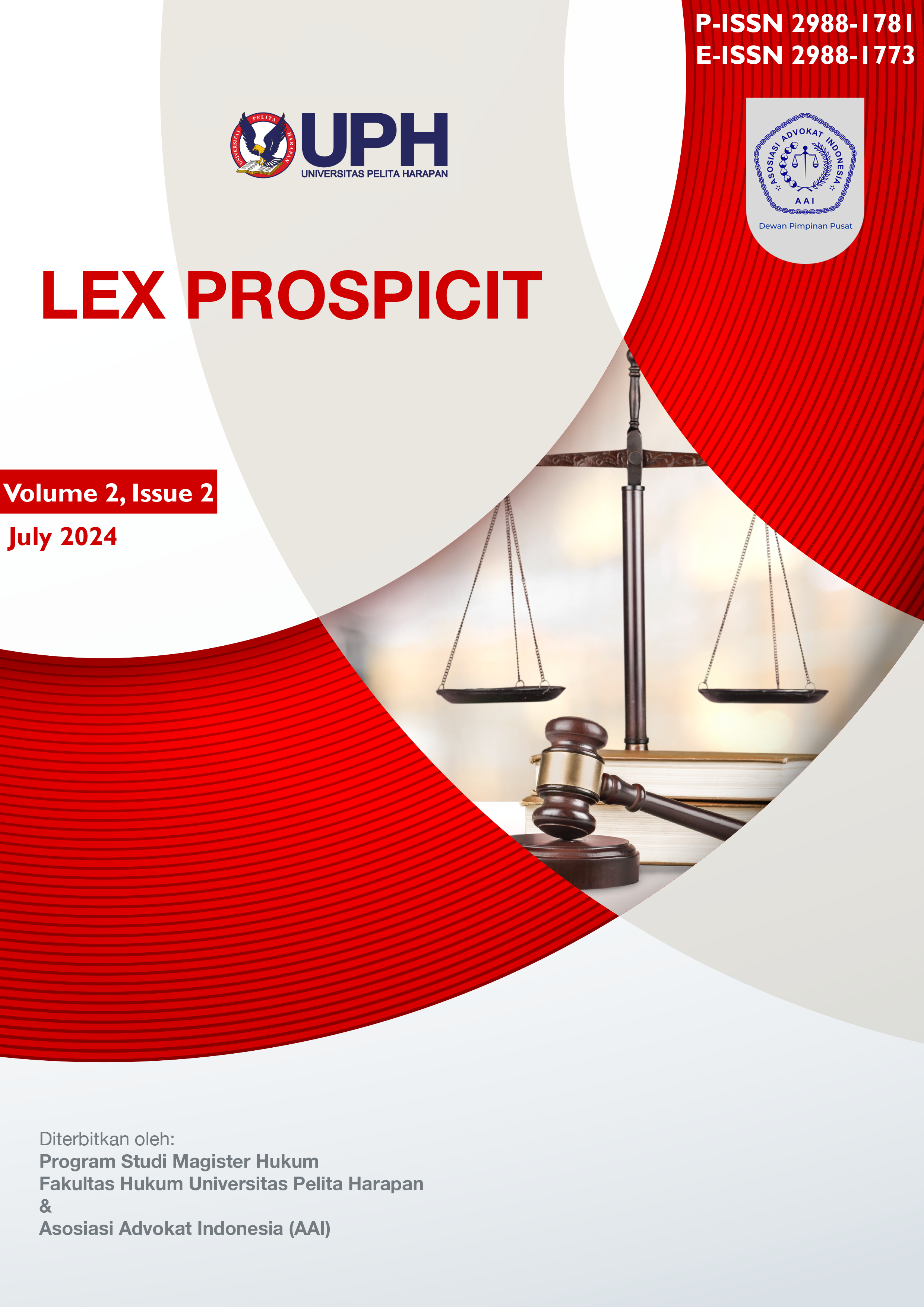Implementation of Legal Provisions in Indonesia Regarding Tax Imposition
DOI:
https://doi.org/10.19166/lp.v2i2.7770Keywords:
Financial Technology, Peer-to-Peer Lending, Financial Services AuthorityAbstract
Tax is a mandatory contribution to the state owed by an individual or entity that is coercive based on law, without receiving direct compensation and is used for state needs for the greatest prosperity of the people. The purpose of this research is to find the implementation of Indonesian legal provisions for franchise businesses in Indonesia and to find out the tax implementation of laws in Indonesia for franchise businesses. Type of research used in this research is normative research using secondary data by conducting document studies in the form of official documents, books, and research results in the form of reports. The approach taken is a statutory approach and a conceptual approach with analyses. From the research results, it is known that the implementation of Indonesian legal provisions for franchise businesses in Indonesia includes the following regulations: contract law, intellectual property rights, taxation, employment, company registration and business permits. The implementation of tax laws in Indonesia for franchise businesses is not running optimally due to obstacles in the form of a lack of government socialization regarding franchise business taxes, a lack of restaurant taxpayers' understanding of franchise tax policies, and a lack of awareness of taxpayers in paying their taxes. There is a willingness to pay where the willingness or desire of taxpayers to pay taxes is low and there is still a lot of taxpayer dishonesty in paying taxes.
References
Books:
Balter, Harry Graham. Tax Fraud and Evasion: A Guide to Civil and Criminal Principles and Practice Under Federal Law. Ronald Press Company, 1963.
Ibrahim, Johny. Teori & Metodologi Penelitian Hukum Normatif. Surabaya: Bayumedia Publishing, 2006.
Lubis, Rahmat Hidayat. Pajak Penghasilan. Yogyakarta, Rajawali Pers, 2018.
Prastowo, Andi. Metode Penelitian Kualitatif dalam Perspektif Rancangan Penelitian. Yogyakarta: Gadjah Mada University Press, 2014.
Mansury. Kebijakan Fiskal. Jakarta: Yayasan Pengembangan dan Penyebaran Pengetahuan Perpajakan, 1999.
Mardiasmo. Perpajakan. Yogyakarta: Publisher Andi, 2011.
Marzuki. Metodologi Riset. Yogyakarta: PT Hanindita Offset, 2005.
Marzuki, Peter Mahmud. Penelitian Hukum. Jakarta: Kencana Perdana Media Group, 2007.
Mulyadi. Implementasi Kebijakan. Jakarta: Balai Pustaka, 2015.
Sadjaruddin, Baros Wan. Beberapa Sendi tentang Hukum Perikatan. Medan: USU Press Medan, 1985.
Setiawan, Guntur. Implementasi dalam Birokrasi Pembangunan. Jakarta: Balai Pustaka, 2004.
Siahaan, Marihot P. Utang Pajak, Pemenuhan Kewajiban dan Penagihan Pajak dengan Surat Paksa. Jakarta: PT RajaGrafindo Persada, 2004.
Soemitro, Rochmat, and Dewi Kania Sugiharti. Asas dan Dasar Perpajakan 1. Bandung: PT Refika Aditama, 2010.
Sunggono, Bambang. Hukum dan Kebijaksanaan Publik. Jakarta: Sinar Grafika, 1994.
Journal Article:
Fattah, Damanhuri. “Teori Keadilan Menurut John Rawls.” Journal of TAPIs 9, no. 2 (July–December 2013): 30-45. https://ejournal.radenintan.ac.id/index.php/TAPIs/article/view/1589.
Court Ruling:
Decision of Tax Court Number PUT.31505/PP/M.IV/19/2011.
Internet:
Febriana, Nadia Nur. “Melihat Pajak atas Bisnis Waralaba.” Direktorat Jenderal Pajak, August 30, 2022. https://www.pajak.go.id/id/artikel/melihat-pajak-atas-bisnis-waralaba.
Others:
Mahendra. “Pajak Sebagai Pilar Negara.” Supplement of Tempo Edition 25 October-4 November 2012.
Interviews:
Sukandar, Anang. Interview by author, November 30, 2023.
Muir, Teguh Aaron. Interview by author, December 1, 2023.
Soepriyanto, Septo. Interview by author, November 28, 202
Downloads
Published
How to Cite
Issue
Section
License
Copyright (c) 2024 Abednego Parlindungan Darma

This work is licensed under a Creative Commons Attribution-ShareAlike 4.0 International License.
Authors who publish with this journal agree to the following terms:
1) Authors retain copyright and grant the journal right of first publication with the work simultaneously licensed under a Creative Commons Attribution License (CC-BY-SA 4.0) that allows others to share the work with an acknowledgement of the work's authorship and initial publication in this journal.
2) Authors are able to enter into separate, additional contractual arrangements for the non-exclusive distribution of the journal's published version of the work (e.g., post it to an institutional repository or publish it in a book), with an acknowledgement of its initial publication in this journal.
3) Authors are permitted and encouraged to post their work online (e.g., in institutional repositories or on their website). The final published PDF should be used and bibliographic details that credit the publication in this journal should be included.


